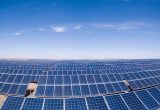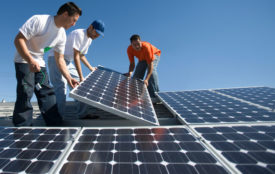Cuba Seeks to Expand Role of Renewable Energy
Cuba and IRENA host workshop on integrating higher shares of renewable energy.
The government of Cuba and the International Renewable Energy Agency (IRENA) are holding a workshop on approaches to operating and planning electricity systems with higher shares of variable renewable energy in the island nation of Cuba. Taking place in Havana from the 24th to 26th of August, with the support of the German Government’s International Climate Initiative, the three-day workshop is the first of its kind in the country and will facilitate the exchange of knowledge between Cuban technical experts and international planners and operators. They will identify key issues and challenges which need to be addressed in order to reliably operate Cuba’s electricity grid, including the management of high shares of renewable energy.
Speaking at the event, Cuban Minister of Energy and Mines, Alfredo López Valdés said, “Today in Havana, the purpose of starting an exchange with IRENA becomes real. This exchange will not conclude with this event and we are sure that it will consolidate the traditional friendship between IRENA and the Cuban institutions. The political will of our government to keep the fight against climate change: a struggle that is a moral obligation and an essential opportunity for a sustainable development. This is reflected in the national policy approved in June 2014 for the development of renewable energy and energy efficiency.”
Cuba has a total generating capacity of almost 6 gigawatts (GW), currently 4 per cent of total electricity production is renewable. Renewable energy sources, such as wind (up to 2 GW) and solar power (up to 14 GW), have vast potential to reduce dependence on fossil fuels in the power sector. The Cuban Government aims to boost renewable energy investment by USD 3.5 billion in order to reach its goal of generating 24 per cent of its power from renewable energy by 2030. This investment seeks to add approximately 700 megawatts each of onshore wind, solar photovoltaic and biomass power generation, reaching a total of around 2.1 GW of new renewable energy capacity.
Speaking at the event opening, State Secretary Jochen Flasbarth of the German Federal Ministry for the Environment, Nature Conservation, Building and Nuclear Safety (BMUB) said, “We commend Cuba on its goal to increase its share of renewables in total electricity production to 24 per cent by 2030. Raising the share of renewable energy is key for the necessary transformation of the energy sector to limit global warming in line with the Paris Climate Change Agreement and also for realising the Sustainable Development Goals set out in the 2030 Agenda.”
The International Climate Initiative of BMUB is supporting low-emission development pathways in partner countries. Keeping global warming to well below 2°C, even to below 1.5°C, means decarbonising the world economy. Helping developing countries expand renewable energies is therefore of high priority.
It is envisioned that as part of the successful implementation of the workshop, additional areas of support may be identified by IRENA and partner organizations that can facilitate renewable energy deployment in Cuba.
“Most island states are largely dependent on imported fossil fuels for the majority of their energy needs and thus vulnerable to volatile global fuel prices and high fuel transport costs,” said IRENA Director-General Adnan Z. Amin. “Accelerating domestic renewable energy production will not only improve energy security and strengthen economic development but also reduce emissions that contribute negatively to public health and the changing climate. IRENA looks forward to working closely with Cuba to advance the deployment of renewable energy in the island and accelerate its transition to a sustainable energy future” Mr. Amin added.
It is envisioned that as part of the successful implementation of the workshop, additional areas of support may be identified by IRENA and partner organizations that can facilitate renewable energy deployment in Cuba.
“Cuba has excellent technical potential for renewable energy to meet its ambitious government targets, particularly for solar, wind and biofuel,” said Dolf Gielen, Director of IRENA’s Innovation and Technology Centre. “By pursuing ambitious strategies on renewable energy that focus on integrating high shares of variable renewables, Cuba can improve the security, reliability and sustainability of its energy systems.”







